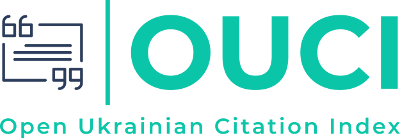Formation of a set of informative features when deciding problems of predicting the durability of structures
DOI:
https://doi.org/10.34185/1562-9945-6-137-2021-05Keywords:
information features, extraction and formation of information features, Kendall's methodAbstract
The paper proposes a method for extracting informative features for the training sample in the problems of predicting the durability of corroding structures. The work aims to analyze and evaluate the informative features that improve the quality of the data and to structure them. Kendall`s method is used to determine the value of each trait. It is proposed to use the training sample to work with a neural network or to build a fuzzy knowledge base only after the formation of a set of information attributes on their value.
References
Dy J.G. Feature Selection for Unsupervised Learning /J.G. Dy, C.E. Brodley //J. of Machine Learning Research. – 2004. – Vol. 5. – Р. 845–889.
Kolesnikova S.I. Metody analiza informativnosti raznotipnyh priznakov [Methods for analyzing the informativeness of different types of signs] /S.I. Kolesnikova// Vesnik Tomskogo gosudarstvennogo universiteta: Upravlenie, vychislitel'naja tehni-ka i informatika. – 2009. - № 1(6), Obrabotka informacii. – S. 69-80. (in Russian)
Korotka L.I, Zelentsov D.G. Method of solving optimal design problems based on flexible tolerance strategy / L.I. Korotka, D.G. Zelentsov // International Journal of Mathematical Modelling and Numerical Optimisation. – 2020. – Vol.10, No.3. – pp. 255-269. DOI: 10.1504/IJMMNO.2020.108613
Korotka L.I. The use of fuzzy clustering in solving problem in predicting the dura-bility of corrosive structures/ L.I. Korotka // Mathematical modeling. – 2020. – №2(43). С. 44-54. DOI: 10.31319/2519-8106.2(43)2020.219266
Levkin D.A., Berezhna N.H., Makarov O.A., Kutia O.V. Matematychne modeli-uvannia tekhnichnykh system [Mathematical modeling of technical systems] /D.A. Levkin, N.H. Berezhna, O.A. Makarov, O.V. Kutia// Vcheni zapysky Tavriiskoho Natsionalnoho Universytetu imeni V.I. Vernadskoho. – 2021. – Vol. 32, Issue 71. – S. 98-102. (in Ukrainian)
Lohvin A.O. Typy heneratyvnykh neironnykh merezh [Types of generative neural networks]/ A.O Lohvin // Informatyka, obchysliuvalna tekhnika ta avtomatyzatsiia: Vcheni zapysky TNU imeni V.I. Vernadskoho. Seriia: Tekhnichni nauky. – 2021. – C. 103-109. DOI: 10.32838/2663-5941/2021.1-1/17 (in Ukrainian)
Matsuha, O.M. Informatsiini tekhnolohii rozpiznavannia obraziv: Navchalnyi posibnyk do vyvchennia kursu ["Information technologies of pattern recognition"] /O.M. Matsuha, Yu.M. Arkhanhelska, N.M. Yereshchenko. – D.:RVV DNU, 2016.–60s. (in Ukrainian)
Paklin N.B. Biznes-analitika: ot dannyh k znanijam: ucheb. posobie [Business analytics: from data to knowledge: textbook. Allowance] /N.B. Paklin, V.I. Oreshkov. – SPb: Piter, 2013. – 704 s. (in Russian)
Vjatchenin D.A. Nechetkie metody avtomaticheskoy klassifikacii [Fuzzy methods of automatic classification] /D.A. Vjatchenin. – Mn.: UP «Tehnoprint», 2004. – 219 s. (in Russian)
Zagorujko N.G. Prikladnye metody analiza dannyh i znanij [Applied methods of data and knowledge analysis ] /N.G. Zagorujko. – Novosibirsk: IM SO RAN, 1999. – 270 s. (in Russian)
Zelentsov D.G., Korotkaya L.I. Tehnologii vyichislitelnogo intellekta v zadachah modelirovaniya dinamicheskih sistem: monografiya [Technologies of Computational Intelligence in Tasks of Dynamic Systems Modeling: Monograph] / D.G. Zelentsov, L.I. Korotkaya,. – Balans-Klub, Dnepr, 2018. – 178 p. DOI: 10.32434/mono-1-ZDG-KLI (in Russian)
Zelentsov D.G., Korotka L.I., Denysiuk O. R. The Method of Correction Functions in Problems of Optimization of Corroding Structures /D.G. Zelentsov, L.I. Korotka, O.R. Denysiuk// Advances in Computer Science for Engineering and Education III (ICCSEEA 2020), 2020. – pp 132-142. DOI: 10.1007/978-3-030-55506-1_12
Zelentsov D., Us S., Koryashkina L., Stanina O. Solving Continual Two-Stage Problems of Optimal Partition of Sets / D. Zelentsov, S. Us, L. Koryashkina, O. Stanina// International Journal of Research Studies in Computer Science and Engineering (IJRSCSE). 2017. – Volume 4, Issue №4. - P. 72-80.
















